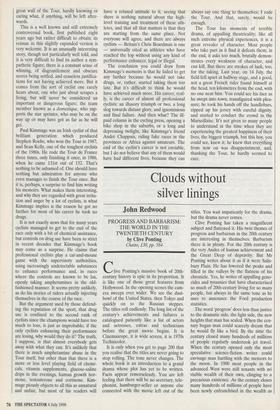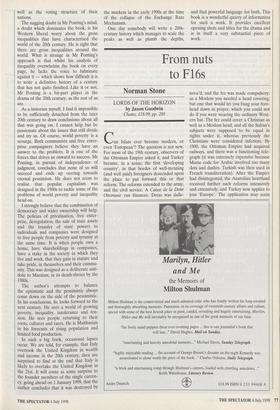Clouds without silver linings
John Redwood
PROGRESS AND BARBARISM: THE WORLD IN THE TWENTIETH CENTURY by Clive Pouting Chatto, f30, pp. 584 Clive Ponting's massive book of 20th- century history is epic in its proportion. It is like one of those great features from Hollywood. In the opening scenes the cam- era sweeps ever wider. We see the dust- bowl of the United States, then Tokyo and quickly on to the Russian steppes. The titles roll endlessly. The long list of the century's achievements and failures is catalogued patiently like a list of actors and actresses, extras and technicians before the great movie begins. It is Cinemascope, it is wide screen, it is 1970s Technicolor.
It is only when you get to page 200 that you realise that the titles are never going to stop rolling. The tone never changes. The whole book is an introduction to a grand drama whose plot has yet to be written. Facts appear remorselessly. You are left feeling that there will be no secretary, tele- phonist, hamburger-seller or anyone else connected with the movie left out of the titles. You wait impatiently for the drama, but the drama never comes.
Clive Ponting has taken a magnificent subject and flattened it. His twin themes of progress and barbarism in the 20th century are interesting in themselves. Barbarism there is in plenty. For the 20th century is the very Andes of human achievement and the Great Deep of depravity. But Mr Ponting writes about it as if it were Salis- bury Plain. He has lowered the peaks and filled in the valleys by the flatness of his chronicle. Yes, he writes of appalling geno- cides and tyrannies that have characterised so much of 20th-century living for so many people, but always in the same tone as he uses to announce the Ford production statistics.
The word 'progress' does less than justice to the dramatic side, the light side, the new heights that man has scaled. When the cen- tury began man could scarcely dream that he would fly like a bird. By the time the century closed many hundreds of millions of people regularly undertook jet travel. When the century opened only the most speculative science-fiction writer could envisage man hurtling with the meteors to the moon. In 1900 most people in the advanced West were still tenants with no visible wealth of their own, clinging to a precarious existence. As the century closes many hundreds of millions of people have been newly enfranchised in the wealth as well as the voting structure of their nations.
The nagging doubt in Mr Ponting's mind, a doubt which dominates the book, is his Western liberal worry about the gross inequalities that have characterised the world of the 20th century. He is right that there are gross inequalities around the world. What is strange in Mr Ponting's approach is that whilst his analysis of inequality overwhelms the book on every page, he lacks the voice to fulminate against it — which shows how difficult it is to write a definitive history of a century that has not quite finished. Like it or not, Mr Ponting is a bit-part player in the drama of the 20th century, as the rest of us are.
As a historian myself, I find it impossible to be sufficiently detached from the later 20th century to draw conclusions about all that was going on. I cannot help but be passionate about the issues that still divide and try us. Of course, world poverty is a scourge. Both communists and free enter- prise campaigners believe they have an answer to the problem. It is one of the forces that drives us onward to success. Mr Ponting, in pursuit of independence of judgment, concludes that none of us will succeed and ends up veering towards eternal pessimism. He does not seem to realise that popular capitalism was designed in the 1980s to tackle some of the problems of world poverty and inequality head on.
I strongly believe that the combination of democracy and wider ownership will help. The policies of privatisation, free enter- prise, deregulation, the sale of state assets and the transfer of state powers to individuals and companies were designed to free people from poverty and tyranny at the same time. It is when people own a home, have shareholdings in companies, have a stake in the society in which they live and work, that they gain in stature and take pride, in themselves and their commu- nity. This was designed as a deliberate anti- dote to Marxism, in its death-throes by the 1980s.
The author's attempts to balance the optimistic and the pessimistic always come down on the side of the pessimistic. In his conclusions, he looks forward to the next century. He sees a world of growing poverty, inequality, intolerance and ten- sion. He sees people returning to their roots, cultures and races. He is Malthusian in his forecasts of rising population and limited food production. In such a big book, occasional lapses occur. We are told, for example, that Italy overtook the United Kingdom in wealth and income in the 20th century, then are surprised to find at the end that Italy is likely to overtake the United Kingdom in the 21st. It will come as some surprise to the founder members of the single curren- cy, gding ahead on 1 January 1999, that the author concludes that it was destroyed by the markets in the early 1990s at the time of the collapse of the Exchange Rate Mechanism.
One day somebody will write a 20th- century history which manages to scale the peaks as well as plumb the depths, and find powerful language for both. This book is a wonderful quarry of information for such a work. It provides excellent opening shots and titles for the drama and is in itself a very substantial piece of work.















































































































 Previous page
Previous page